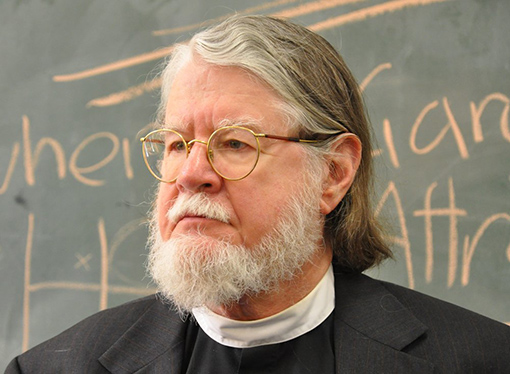Teachable Moments in Times of War and Conflict
The St. Olaf College “Called to Faithfulness” Conference in June 1990 was held in the first years of the ELCA. The conference keynote speech from Dr. Robert Jenson titled “Called to Faithfulness”, was described in July 2009 as “a prescient anticipation of the course of events in the ELCA over the last twenty years. We have not arrived at this Churchwide Assembly by accident. We were warned….” (1)

St. Olaf College

Dr. Robert Jenson
That June there was another major address, this one by Rev. Dr. Carl Braaten, entitled “The Mission of the Gospel”. I was not in attendance but came across a transcript on the internet in 2007 as I was writing Igniting a Passion for Missions: A Guide for Church Leaders. I later saved the transcript in 2015 as I was expanding the ministry of Awakening Lives to World Missions (ALWM). I am thankful that I did, because it’s no longer available anywhere.

Rev. Dr. Carl Braaten
In my writing and speaking I often refer to Dr. Braaten’s words – spoken 35 years ago – as I reflect on the status of Global Mission in Lutheran congregations today. Spoken as the seismic shift to the “Accompaniment” model was taking place in ELCA Global mission, his words herald and foreshadow the decline in Global Mission that has generally continued and become normative over the past generation.
“The church spends prime Time on concerns for which it has no unique competence, but neglects the one thing needful which only the church, and no other agency in the world, has been commissioned to accomplish. There is no doubt that whatever the church can do to accelerate the betterment of human life on this planet is pleasing to God. But the question is, ‘is there not something more, uniquely more, that the church must do besides taking a stand against racism, sexism, poverty, oppression, exploitation and the like’?
The apostolic mission of the gospel created the church; we call it evangelism. God has given the church this commission to go with the gospel to all who do not yet, or who no longer, believe. It is an assignment God has given to no other people in the world. If the church does not proclaim the message of salvation in the name of Jesus to those who do not believe, it will not get done.”
Included in this From the Editor article is the transcript of Dr. Braaten’s speech as it exists from that June 1990 address. It provides, I believe, a helpful background for understanding the current challenge in confessional bodies such as the NALC and LCMC to recover the centrality of God’s call to the nations. Terms like “unreached” and “least reached”, used and understood more commonly outside our theological tradition, are hard to compute when accompaniment is the model, and “people helping” all too often has supplanted “proclamation”. Consider, for example, our ALWM Global Mission partner Swapon Sarker and the Bangladesh Evangelical Lutheran Church (BELC). Their country has 299 distinct people groups (Joshua Project), 276 of which that fit the missiological definition of unreached – less than 2% Christian. The picture here puts a face and a name on only eight of the 276 unreached! (2)

Joshua Project prayer cards of workers in Bangladesh

ALWM Global Mission partner Swapon Sarker

Group of people at the Bangladesh Evangelical Lutheran Church (BELC)
Our mission at CGM is truly to Celebrate Global Mission. I share this powerful address in hopes of continuing to recover the genuine core of Global Mission: proclamation, church planting and discipleship.
“The Mission of the Gospel”
The winds of theological conflict are blowing through the church. People sense there is something wrong1 but they don’t seem to know exactly what it is or what to do about it.
A paradigm shift in mission theology took place in the 60s and 70s. The ecumenical assembly in Bangkok in 1973 discussed the theme, “Salvation Today”. A Roman Catholic observer said, “I am appalled that you people can discuss ‘Salvation Today’…but not listen to what the Apostle Paul said about it. I haven’t heard anyone speak on justification by faith or everlasting life.”
The Lutheran World Federation assembly in Brazil dealt with the cry of God’s people “for salvation.” Its document gets down to the “real business” of the assembly in solving the problems of the poor the global economy, the exploitation of nature, and dialogue with other religions. But there is not a single paragraph that deals with world evangelization, with its basis, content, motive, goals, and method.
The church spends prime Time on concerns for which it has no unique competence, but neglects the one thing needful which only the church, and no other agency in the world, has been commissioned to accomplish. There is no doubt that whatever the church can do to accelerate the betterment of human life on this planet is pleasing to God. But the question is, “is there not something more, uniquely more, that the church must do besides taking a stand against racism, sexism, poverty, oppression, exploitation and the like?”
The apostolic mission of the gospel created the church; we call it evangelism. God has given the church this commission to go with the gospel to all who do not yet, or who no longer, believe. It is an assignment God has given to no other people in the world. If the church does not proclaim the message of salvation in the name of Jesus to those who do not believe, it will not get done.
There are lots of people who know nothing about the gospel of Jesus Christ, yet who care a lot about the earth and the integrity of creation. They march at the front lines for peace and justice, are working for a new international economic order, and give their lives to establish democratic freedom. These are all good things which the Gentiles seek, and God knows that we need them all (Matthew 6:32). But all these important activities are no substitute at all for the good news of God’s justification of poor sinners and the spiritual deliverance of all persons oppressed by sin and the tenors of death and the devil.
Christians alone have been called and ordained through their baptism to address all the Gentiles with the news of God’s salvation so that they may hear and believe. Faith comes by hearing!
We used to speak of missions as “foreign” missions. There was no doubt in the mind of the missionaries what they were supposed to do. They were to preach the gospel of Jesus Christ and to start new churches. And they did it with an eschatological perspective. There was something gloriously right about that. The gospel was the essential core of the Christian mission. Anyone familiar with the scene knows that missionaries were not worrying over much about the souls of the natives to the neglect of their bodies. They became sacrificially involved in health care, in founding hospitals and schools of all kinds, in agricultural and industrial ants, in literary and publication projects. All these activities were seen as auxiliaries of the gospel. They practiced “holistic” mission.
It is sometimes said that the contemporary concept of mission is “holistic”. There is a big hole in holistic mission, however, when it cuts out the core of the gospel.
Yes, the mission of the gospel is uniquely the church’s. That does not primarily mean entering into solidarity with all people of good will who want to deal with the emergency situations in which the world finds itself. The mission of the gospel is to continue Christ’s redemptive mission through preaching the gospel everywhere, making disciples, and baptizing them in the name of the Father and of the Son and of the Holy Spirit. The idea itself sounds downright silly and useless to Jews and Greeks; indeed, to all of us. We hear over and over again from the new missiology that what the world needs now is not verbal proclamation but good deeds.
The church lives in the historical tension between the “already” and the “not yet”, called to be faithful to God’s mission in the interim. The reign of Christ, meanwhile, is the way of the cross, giving us a new calculus to figure the difference between victory and defeat. The core of the gospel mission is always Christ. “Christ alone” is the content and criterion of the message of the gospel.
This grounding of mission should make clear that God and not the church is the primary subject and source of mission, Advocacy is what the church is about, being God’s advocate in the world.
But ours is an age of apostasy in which humanity has become god to itself. “Humanity is the measure of all things.” All that matters now is that the church get involved in social and political analysis, go where the action is, mobilize the good intentions of its members, and pass world-shaking resolutions at its general assemblies. What the world calls justice seems much more tangible and necessary than the righteousness that God has bestowed freely from above through faith in Jesus Christ.
What a turn-about in mission thinking! Consider what the Willingen Assembly of the International Missionary Council in 1952 said:
“The Cross does not answer the world’s questions, because they are not the real questions. It confronts the world with the real questions, which are God’s question “casting down all that exalts itself in defiance of him, bringing to nothing the idolatries by which people are deceived, and raising up those who are sunk in disillusionment and despair.”
Compare also: Speaking about the ecumenical assembly in Uppsala in 1968. one British theologian said,
“The Assembly was preoccupied with the hunger, poverty and injustices of the contemporary world. I myself was deeply moved and challenged by it. What worried me, is that I found no comparable compassion or concern for the spiritual hunger of the unevangelized millions . . . The Lord set his Church to preach the good news and make disciples. but I did not see the Assembly cager to obey this command of his. This same Lord wept over the unrepentant city which had rejected him, bull did not see the Assembly weeping any similar tears!”
Lutherans have been poised between two opposing theologies of mission. Evangelicals stress the absolute priority of evangelism aimed at eternal salvation through personal faith in Jesus Christ, searching out opportunities in world history for whole peoples to respond to the proclamation of the gospel. “We beg you for Christ’s sake, be reconciled to God” (1 Corinthians 5: 20). The Ecumenicals seem to have replaced zeal for evangelism by social ethical concerns. Making Christians and planting churches have given way to combating unjust systems and changing social structures.
The vertical dimension of reconciliation with God is not an alternative to the horizontal dimension of social transformation, however.
Lutherans should be the first to acknowledge that. The verbal proclamation of the gospel must always be authenticated by diaconal works of love.
Meanwhile, simple believers are shown dramatic pictures of the good things the church is doing around the world, and they assume that the primary goal of preaching ‒ so that people might believe in Christ and be baptized ‒ is still the engine that drives the global mission programs of the church. But there is a growing suspicion among pastors and laity today that mission without gospel is being promoted.
Nothing is more fashionable in contemporary missiology than to talk about “dialogue” with people of other faiths and ideologies. That word has become a substitute for evangelism. Dialogue is the new in-thing, but often the theology supporting it borders on treason and betrayal of the gospel. Many ecumenical missiologists believe and teach that Christ is already savingly present in all the religions.
Here there is a great confusion of law and gospel. Lutherans have confessed that God is providentially at work in the world of the Gentiles, that he has not left himself without a witness, that in God we all “live and move and have our being”. There is a universal revelation of God through creation and law, no matter how much truth has been suppressed, so that nobody is “without excuse.” But nowhere in Scripture is it ever said that the general knowledge of God brings salvation. A church or theology that cannot distinguish between the concerns of inter-religious dialogue and the assertions of the gospel is bankrupt.
What must we do to get our mission theology back on track? The first thing is to think more radically out of the biblical frame of reference as the authoritative source and rule of our faith, doctrine, and practice. In the past two decades we have witnessed the collapse of biblical foundations in contemporary theology, and this has let the church meander in the most bewildering directions.
Secondly, define the “Kingdom of God” on the basis of biblical theology. The idea of the kingdom has come to stand for a mixed bag of things in mission statements. The New Testament proclaims that the present stage of eschatological fulfillment has taken place already in the person and ministry of Jesus Christ, and a final stage representing the transformation of the historical and cosmic conditions will take place at the end of history and the world.
Thirdly, the broken relationship between God and the fallen world has been restored and the gift of new fellowship with God has been granted by the Spirit to those who believe in Christ and are baptized. This gift is mediated through preaching the Word and the administration of the sacraments. This then is the abiding core of evangelism “communicating the gift of new life with God on the basis of the death and resurrection of Jesus Christ.”
Fourthly, the church is called to the front lines of struggle against the enemies of God’s kingdom: sin, death and the devil. It is a constant spiritual struggle that must go on everywhere in the world until the end of time. The present structures of this fallen world will be transformed as God’s own doing on the day of the final advent of Christ and the consummation of all things in the power and glory of God.
Fifthly, the prime missionary task of the church is to be the church in action, proclaiming Jesus Christ to all the nations. closing ranks with all fellow-believers for mutual encouragement in the one true faith. So, it may become imperative to call for an ecumenical realignment in which Lutherans cultivate closer association and cooperation with Evangelical and Catholic communities that have not capitulated to the new missiology.
Finally, our Lutheran evangelical commitment does not detract but rather stimulates our responsibility to care for people who suffer injustice. The tendency of some Lutherans to accommodate to the liberationist’s equating of God’s justification and human justice, by exchanging his justification of sinners for his alleged preferential option for the poor, deals a deadly blow to the high priority of evangelism. Striving for peace and justice and denouncing poverty and oppression need not be purchased at the expense of the uniqueness of Christ and the proclamation of the gospel. It is precisely the gospel that frees us to work for a more humane and just world. Because our hope is grounded in God we can afford to take the risk of losing ourselves so that others may live more fully.
— Excerpted from Prof Braaten’s dynamic address to the 1990 St. Olaf Conference, “A Call to Faithfulness”. Braaten was Prof. of Systematic Theology at Lutheran School of Theology at Chicago and Director of the Center for Catholic & Evangelical Theology. The web posting above from 2015 is no longer accessible.






